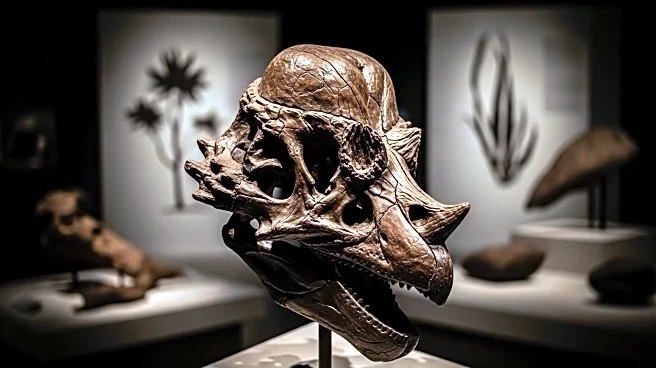What's Happening?
A new dinosaur species, Zavacephale rinpoche, has been discovered in the Eastern Gobi Desert of Mongolia. This dome-headed dinosaur, part of the pachycephalosaur group, is one of the most complete specimens found, lacking only parts of the neck, ribcage, and lower arm. The discovery, led by Tsogtbaatar Chinzorig and colleagues from the Mongolian Academy of Sciences, challenges previous theories about pachycephalosaur evolution, suggesting that domed skulls developed earlier than previously thought. The specimen also contains gastroliths, indicating an omnivorous diet, and features fang-like teeth and slender hindlimbs, suggesting it was capable of fast running.
Why It's Important?
The discovery of Zavacephale rinpoche provides significant insights into the evolution of pachycephalosaurs, a poorly understood group of dinosaurs. By dating back to the Early Cretaceous period, this find suggests that domed skulls evolved earlier than previously believed, offering new perspectives on dinosaur development and behavior. The presence of gastroliths and omnivorous traits expands understanding of dietary habits among dinosaurs, potentially influencing future paleontological research and theories. This discovery enriches the scientific community's knowledge of dinosaur diversity and adaptation.
What's Next?
Further research and analysis of Zavacephale rinpoche could lead to a deeper understanding of pachycephalosaur evolution and their ecological roles. Scientists may explore additional sites in Mongolia to uncover more specimens, which could provide further evidence to support or challenge existing theories. The discovery may also prompt reevaluation of other dinosaur groups' evolutionary timelines, influencing paleontological studies and educational content.
Beyond the Headlines
The discovery of Zavacephale rinpoche highlights the importance of international collaboration in paleontology, as researchers from different countries contribute to understanding prehistoric life. It also underscores the potential for significant finds in less-explored regions like Mongolia, encouraging further exploration and investment in these areas. The ethical considerations of fossil excavation and preservation may also come to the forefront, as scientists balance the need for research with respect for local cultures and environments.











